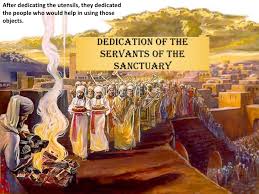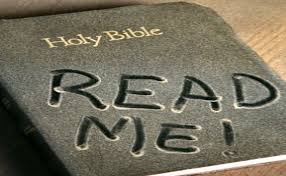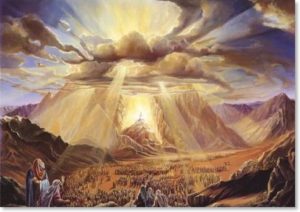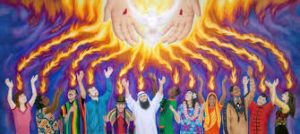Pasch was devoid of any idolatrous elements There was no Lent attached Lent came on line sometime late in the 4th century, even in to the 5th century. Lent, however, had its origin in the worship of Ishtar, the Babylonian goddess of fertility. The 40-days of Lent...
Yeshua Messiah (aka Jesus Christ) as our Apostle and High Priest
Yeshua Messiah (aka Jesus Christ) as our Apostle and High Priest
Yeshua Messiah (Jesus Christ)--Apostle and High Priest
During my morning studies today I was led to pick up where I left off from this past Sabbath’s Brit HaDashah reading that is found in Hebrews 3:1-6. Interestingly enough, roughly 1-1/2 to 2 hours after beginning the study, I had not progressed beyond verse one. For me, this single verse took me on an exploratory journey (which I had to ultimately bring to a prematurely abrupt ending) into the Person of our Master Yahoshua Messiah (known of course to most of the world as Jesus Christ). The author In this particular passage of the Holy Writ, which many scholars have attributed to Paul, mentions two vocational attributes of our Master’s that deserves our attention: His Apostleship and His High Priestly assignment. These two vocational attributes go a long way towards defining for us, in part I will concede, just who this man of sorrows and grief (Isaiah 53:3), presently exalted above all creation, really is.
The Writer Writes
The writer writes:
Therefore, holy brethren, partakers of a heavenly calling, consider Jesus (i.e., Yahoshua), the Apostle (Gr. apostolos; an emissary; messenger; one who is sent forth) and High Priest (Hb. Cohen Gadol) of our confession (or profession); He was faithful to Him who appointed Him, as Moses also was in all His house (Hebrews 3:1,2; NASB).
Jesus Christ (Yeshua Messiah) the Apostle
I would dare say that most Netzarim have never given any thought to the apostolic aspect of Yahoshua’s life and ministry here on earth, much less someone actually conferring upon Him a title of Apostle. And I would venture to suggest the reason many of us have failed to identify Yahoshua as an apostle is because we have been conditioned by churchianity to only identify Yeshua with His death, burial and resurrection. Truth be told, however, Yahoshua’s atoning sacrifice was only one aspect of His ministry. Master’s greater role, or ministry if you will, is His bringing the Gospel of the Kingdom to this corrupt and dying world. Contained in this greater role of bringing the Gospel of the Kingdom to the world where we find His apostleship.
Too Much Emphasis Placed on Another Gospel
Indeed, churchianity emphasizes a Gospel (i.e., good news) about Jesus Christ. However, the Body is obliged to emphasize the message brought to us by God’s (i.e., YHVH’s) Emissary and Messenger. It is then essential that we consider the fullness of that apostleship role that Master perfectly fulfilled. The delivery of the message did not stop with the death, burial and resurrection of Messiah. Indeed, it was passed along to those who would be Yahoshua’s disciples. For it was at the time that Master appeared to His select disciples after His Passion that He succinctly put forth the fullness of His greater calling. To His disciples Yeshua said:
Peace be with you. As the Father has sent Me, I also send you (John 20:21; NASB).
This is the crux of the Apostle’s purpose and mission in life: to go forth and deliver the Gospel of the Kingdom to the nation peoples of this dying world of ours (Matthew 28:19). Paul (i.e., Shaul) goes on to describe Master’s apostleship as a ministry with wide-sweeping implications, giving us an even closer look at the Person of Yahoshua:
Jesus Christ (i.e., Yeshua Messiah) was a minister of the circumcision (i.e., the Jewish people) for the truth of God to confirm the promises made unto the fathers… (Romans 15:8; KJV).
Shaul here describes Master as a Jewish minister delivering the “Truth of YHVH” to the Jewish nation. The Truth of YHVH is none other than Father’s Word: His Torah. Sadly, however, the Jewish nation rejected the Truth of YHVH that Master was sent to deliver to them as confirmed by the Apostle John who wrote:
He came unto His own and His own received Him not (John 1:11; KJV).
Furthermore the promises made to the fathers were contained in the Word of YHVH. These promises are embodied in the covenant that Father made to Abraham, Isaac and Jacob and to the children of Israel. The promises included making Israel a royal nation of priests; a special (i.e., a peculiar) and holy people unto the Creator of the Universe, above all the nations that are upon the earth (Deuteronomy 14:2; cf. Deuteronomy 26:18; Titus 2:14; 1 Peter 2:9).
Jesus Christ (Yeshua Messiah) the High Priest
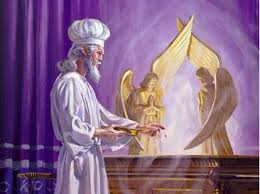
Master Yeshua was uniquely qualified to be our High Priest, today operating in the Temple in Heaven.
The other aspect of the Person of Yahoshua that the writer of the Hebrew passage draws our attention to is the High Priest ministry He fulfills even today. If we follow the line of reasoning set forth in the first-verse of Hebrews chapter 3, we are led to the next chapter where we find an overview of the Person of Yahoshua from the standpoint of His High Priest function.
Master’s Unique Qualifications to be High Priest
The writer describes Yeshua as being a flesh and blood human being during His earthly ministry. Although the most unique human being ever to walk this planet, Yahoshua from the standpoint of creation was just like us: flesh and blood. He faced and dealt with every human emotion and physical challenge. And being a flesh and blood human being, Yeshua was subject to death and He possessed the free will that would afford Him the opportunity to sin if He so chose. Those who would say that Yeshua was the God of the Old Testament, the maker and supreme rule of heaven and earth, would be hard-pressed to defend their position against these crucial proofs to Master’s complete and full humanity. But then, this is not a discussion on the original divinity of Yeshua Messiah. (See my posts entitled, “Will the True God of the Old Testament Please Stand Up” and “Are the Father and the Son the Same Person?“)
The one aspect of Yeshua’s Person that separated Him from every other human being ever to live is that He was sinless: He lived a perfect life. This critical aspect of the Master’s life, coupled with His humanity, made Him uniquely qualified to be the perfect sacrifice for the sins of the world. Man gave over the title-deed of this world and of his life to the enemy, hasatan, when He disobeyed YHVH in the Garden. That single act of disobedience resulted in the enemy being handed over ownership of the entire world and this represents total and complete power over all creation.
Given His perfect, sinless life, and being a flesh and blood, human being, Yahoshua became the perfect sacrifice that would destroy the power the enemy (i.e., hasatan) holds over us, particularly those of us who are of Abraham’s seed. And being the perfect sacrifice that destroys hasatan’s power over us, Yeshua is also the perfect High Priest unto YHVH. He is merciful and faithful and stands before Father, interceding on our behalf in opposition to Lucifer’s constant accusations against us. Because He went through the human experience, Master can genuinely sympathize with our weaknesses (Hebrews 2:17; 4:14, 15). Indeed, He was tempted in every way as we are. Yet He sinned not. Indeed, Yeshua knows all about us.
The Heavenly Versus Earthly High Priesthood
When we compare and contrast the Levitical High Priests (i.e., the earthly High Priests) with that of Yeshua’s High Priesthood (our heavenly High Priest), we find that the earthly high priests were men, like Yeshua, who could identify with the weaknesses of the people (Psalm 110:4; Hebrews 5:1, 2). However, the earthly, Levitical High Priests before they could offer the atoning sacrifices on behalf the people, they were required first to seek atonement for themselves (Hebrews 5:3). Qualification-wise, the Levitical High Priests had to be of Aaron’s direct line and then be called or selected by YHVH to serve in that office (Hebrews 5:4). Yeshua, in like manner, was appointed High Priest by YHVH, who, as an aside, also adopted Him as His Son (Hebrews 5:5, 6). Even though Yahoshua was Yah’s favored Son, Yeshua still had to perform and do that which Father required of Him to do. Despite the brutal and arduous nature of the assignment given to Him by His Father which no doubt broke the Father’s heart from time to time, YHVH knew that Yeshua’s obedience would result in the Master’s perfection and ultimately salvation for all who would obey Him (Hebrews 5:7-9). Thus, Abba declared Yahoshua High Priest according to the order of Melchizedek, which is an eternal, perfected High Priesthood that transcends the earthly, Levitical High Priesthood (Hebrews 5:10).
Before the foundations of the earth were laid, Father had this thing all figured out. Father knew the type of High Priest that would be required to win back from hasatan the title deed of creation. Such a High Priest would need to be holy; innocent; undefiled; sanctified and favored; and exalted. Indeed, we find this perfectly typified in the Person of our Master and Savior, Yahoshua Messiah.
Let us be blessed in the knowledge and affirmation that we have a High Priest operating in the Heavenly Temple even today, who is interceding on our behalf before Father and whose atoning sacrifice has forever bridged the chasm that once existed between us and our Creator.
Have a blessed day in Yeshua Messiah. Walk in the power and might of His Ruach HaKodesh. Shalom.
Faithfully Submitted,
Rod

